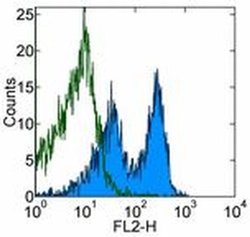Learn More
Invitrogen™ CD150 Monoclonal Antibody (9D1), Functional Grade, eBioscience™
Rat Monoclonal Antibody
$211.00
Specifications
| Antigen | CD150 |
|---|---|
| Clone | 9D1 |
| Concentration | 1 mg/mL |
| Content And Storage | 4°C |
| Applications | Flow Cytometry, Functional Assay |
Description
Description: The 9D1 monoclonal antibody reacts with mouse CD150, an ~70 kDa transmembrane glycoprotein also known as Signaling Lymphocyte Activation Molecule (SLAM). CD150 is expressed by T (especially TH1) and B cells and its expression is rapidly upregulated on these cells upon activation. Immature thymocytes and dendritic cells also express this antigen. Signaling through SLAM in T cells induces proliferation and augmentation of the interferon-gamma response. Furthermore, SLAM is thought to play a role in adhesion between the T cell and antigen-presenting cell. 9D1 is reported to be an activating antibody. Mouse hematopoietic stem cells (HSC) can be identified using SLAM family markers, such as CD150+CD244-CD48-. For this application we recommend the use of antibody clone mShad150 (Product # 12-1502). Applications Reported: This 9D1 antibody has been reported for use in flow cytometric analysis. 9D1 has also been reported to augment T-cell activation including inducing their proliferation and production of IFN gamma. Applications Tested: This 9D1 antibody has been tested by flow cytometric analysis of mouse thymic and splenic cells. This can be used at less than or equal to 1 μg per test. A test is defined as the amount (μg) of antibody that will stain a cell sample in a final volume of 100 μL. Cell number should be determined empirically but can range from 10^5 to 10^8 cells/test. It is recommended that the antibody be carefully titrated for optimal performan...
CD150 (SLAM, Signaling Lymphocyte Activation Molecule) belongs to the immunoglobulin gene superfamily, and is involved in T cell stimulation. SLAM is constitutively expressed on peripheral blood memory T cells, T cell clones, immature thymocytes, and a proportion of B cells, and is rapidly induced on naive T cells after activation. Activated B cells express the membrane bound form, the soluble form and the cytoplasmic isoforms of SLAM. It is suggested that signalling through homophilic SLAM-SLAM binding during B to B and B to T cell interactions enhances the expansion and differentiation of activated B cells. Reports suggest that the extracellular domain of CD150 is the receptor for the measles virus and acts as a co-activator on T cells and B cells. Moreover, CD150 is thought to interact with SH2D1A and with PTPN11 via its cytoplasmic domain. Mutations CD150 gene may be associated with X-linked lympho-proliferative disease (XLP).Specifications
| CD150 | |
| 1 mg/mL | |
| Flow Cytometry, Functional Assay | |
| Functional Grade | |
| Rat | |
| RUO | |
| PBS with no preservative; pH 7.2 | |
| Q9QUM4 | |
| 27218 | |
| Primary | |
| Affinity chromatography |
| 9D1 | |
| 4°C | |
| Monoclonal | |
| Liquid | |
| IgG1 κ | |
| Mouse | |
| Slamf1 | |
| 4933415F16; AA177906; CD150; CD150 antigen; CDw150; ESTM51; IPO-3; RGD1560634; signaling lymphocyte activation molecule; signaling lymphocytic activation molecule; signaling lymphocytic activation molecule family member 1; Slam; SLAM family member 1; Slamf1 | |
| Slamf1 | |
| Antibody |
The Fisher Scientific Encompass Program offers items which are not part of our distribution portfolio. These products typically do not have pictures or detailed descriptions. However, we are committed to improving your shopping experience. Please use the form below to provide feedback related to the content on this product.

